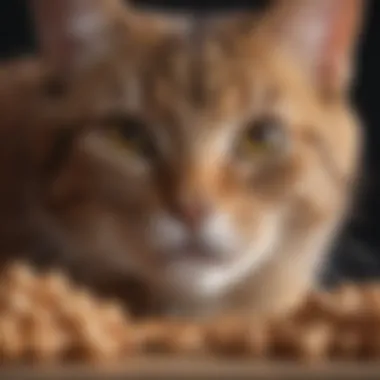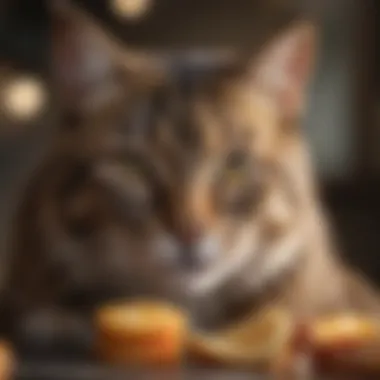Understanding Royal Canin Prescription Cat Food for Renal Health


Intro
Feline health is a complex field, with numerous factors affecting the well-being of our furry companions. Among these, renal health stands out as a significant concern for many cat owners and veterinarians alike. Kidney disease is prevalent in older cats and requires careful management through diet, among other interventions. This is where Royal Canin prescription cat food specifically designed for renal health comes into play.
In this article, we will delve into what makes this brand's diet unique, focusing on its nutritional profile, ingredients, and the essential role it plays in managing kidney-related issues in cats. Additionally, we will cover the significance of veterinary guidance and regular check-ups, which are critical in maintaining feline health. Understanding these aspects helps cat owners make informed decisions that can vastly improve their pet's quality of life.
Nutritional Profile of Royal Canin Prescription Cat Food
Key Ingredients
Royal Canin's formula for renal health provides key nutrients that support kidney function. Ingredients are selected with care to ensure they are beneficial and easy for cats to digest. Some of the major components include:
- Restricted Protein: Reducing protein in the diet can help decrease the workload on the kidneys.
- High-Quality Protein Sources: When protein is necessary, it must come from high-quality sources. This ensures that the cat receives essential amino acids without overburdening its kidneys.
- Lower Phosphorus: High phosphorus levels can be harmful to cats with kidney disease. The diet minimizes this element.
- Increased Omega-3 Fatty Acids: These are known to promote kidney health and overall well-being.
These ingredients come together to support kidney function while providing necessary nutrients. The balance is key in managing chronic kidney disease in felines.
Health Benefits
The health benefits of feeding Royal Canin prescription diet are notable:
- Improved Kidney Function: With appropriate nutrient levels, cats may experience stabilized kidney function.
- Enhanced Quality of Life: Adequate nutrition can lead to a better overall state of health, improving energy levels and activity.
- Support for Other Health Issues: This diet also assists in managing other concurrent health problems common in senior cats, such as obesity or urinary issues.
Nutrition plays a crucial role in managing chronic conditions like kidney disease. It is vital to involve veterinarians in dietary decisions.
Indications for Use
Before introducing a new diet, it is important to recognize when prescription food is appropriate. Royal Canin's renal health formula is often recommended for cats diagnosed with the following conditions:
- Chronic Kidney Disease (CKD)
- Renal Insufficiency
- Specific urinary conditions requiring dietary intervention
Always consult with a veterinarian to determine if this specific diet is appropriate for your cat’s individual health needs.
Potential Side Effects
While Royal Canin is reputable, some cats may experience adverse reactions. Common side effects can include:
- Digestive upset, such as diarrhea or vomiting
- Low appetite, especially if transitioning too quickly to a new food
- Allergic reactions, though uncommon
Monitoring your cat's response to any new food is critical. If adverse effects are observed, consult a veterinarian immediately.
Alternative Options
Though Royal Canin offers a strong formula for renal health, it is not the only option on the market. Alternatives may include other veterinary prescription diets or homemade options, approved by professionals. It’s important to remember:
- Not all foods marketed for renal health are created equally.
- Discuss alternatives with a veterinarian to ensure adequacy and safety.
Culmination
Overview of Feline Renal Health
Feline renal health is a critical aspect of overall well-being in cats. The kidneys play a vital role in filtering waste from the bloodstream, regulating electrolytes, and maintaining hydration. Understanding how these organs function is essential, especially when dealing with conditions such as chronic kidney disease (CKD). The nuances of kidney function create a framework for addressing renal issues through diet, which is why Royal Canin's prescription cat food becomes relevant.
Understanding Kidney Function in Cats


The kidneys are responsible for filtering toxins and excess substances from the blood. They produce urine, which carries waste out of the body. Additionally, kidneys help regulate blood pressure, produce hormones, and maintain the balance of minerals like calcium and phosphorus. A thorough comprehension of these functions enlightens pet owners and veterinarians on the significance of kidney health in cats. As cats age, their kidney function can decline, leading to greater vulnerability to disease. Common markers of kidney health include the levels of creatinine and blood urea nitrogen (BUN) in the bloodstream. Regular blood tests can provide insights into how well the kidneys are functioning.
Common Renal Conditions in Cats
Several conditions can affect the kidneys of felines. Chronic kidney disease is prevalent, particularly among older cats. It occurs when kidney function diminishes over time. Other conditions, such as acute kidney injury, can arise suddenly due to various factors, including toxins, dehydration, or infections. Early detection of these conditions is crucial in managing them effectively. Some symptoms to watch for include increased thirst and urination, weight loss, and changes in appetite. Recognizing these signs can lead to prompt veterinary intervention, potentially improving outcomes for affected cats.
Impact of Diet on Renal Health
Diet plays a significant role in maintaining renal health. Certain nutrients can place additional strain on the kidneys, while others can support their function. For instance, high protein intake can be taxing on already compromised kidneys. Therefore, diets formulated for renal health typically feature controlled protein levels. Additionally, hydration is essential to kidney function, making it vital to encourage fluid intake. Proper nutrition can not only support existing kidney function but also potentially slow the progression of renal disease. Royal Canin's prescription diets take these dietary needs into account, offering tailored options that align with the specific requirements of cats with renal concerns.
A balanced diet designed for renal health can significantly influence the quality of life for cats with kidney disease. Proper nutrition provides support in managing symptoms and prolonging well-being.
Preface to Royal Canin Prescription Cat Food
The realm of feline nutrition is complex, particularly when addressing specific health issues such as kidney disease. This is where Royal Canin prescription cat food takes center stage. This specialized diet aims to provide tailored nutrition that can support renal health in cats suffering from various renal conditions. Ensuring the right balance of ingredients and nutrients is crucial in enhancing their overall well-being and managing chronic kidney disease.
Company Background
Royal Canin has a long-standing reputation in the pet food industry. Established in 1968 by a veterinarian, the company focuses on developing scientifically-backed pet nutrition. This focus on research and quality has led to a range of specialized diets for different health needs, including those for renal health. Royal Canin utilizes a robust scientific foundation, often collaborating with veterinary professionals and nutritionists to design their formulas. This dedication ensures that their products meet the evolving needs of pets and their healthcare providers.
The Concept of Prescription Diets
Prescription diets, such as those offered by Royal Canin, are designed specifically for the management of certain medical conditions. Unlike regular cat food, these diets have precise formulations that cater to the unique needs of cats with health issues. For renal health, this often means lower protein and phosphorous levels, among other adjustments. The concept revolves around the idea that Diet plays a critical role not only in maintaining health but also in managing diseases.
Why Consider Prescription Diets?
- Tailored Nutrition: Each formula addresses the specific dietary needs related to health issues.
- Enhanced Quality of Life: Proper nutrition can aid in symptom management and improve the overall quality of life.
- Veterinary Guidance: These diets should be used under the supervision of a veterinarian, ensuring that they are suitable for the individual cat's health condition.
Prescription diets play a pivotal role in managing feline health, particularly for conditions like chronic kidney disease.
Understanding these elements is essential for both veterinarians and pet owners. The choice of diet can greatly influence the health outcomes of cats suffering from chronic kidney disease, making Royal Canin's prescription diets a critical consideration.
Nutritional Profile of Royal Canin Renal Diet
The nutritional profile of Royal Canin Renal Diet plays a crucial role in managing feline kidney health. It provides the essential nutrients required for cats suffering from renal issues. These formulations are not just standard pet food; they are specifically designed to address the unique metabolic needs of cats with kidney disease. The right nutrients can support kidney function, enhance overall health, and minimize the progression of chronic disorders.
Key Ingredients and Their Functions
Royal Canin incorporates various high-quality ingredients in its renal diet to promote healthy kidney function.
- Protein: These diets contain controlled levels of high-quality protein. Protein is necessary, but excessive amounts can strain the kidneys.
- Phosphorus: The phosphorus levels are carefully monitored. Decreased phosphorus intake is vital, as high levels can worsen kidney function.
- Omega-3 Fatty Acids: These fatty acids, sourced from fish oil, have anti-inflammatory properties that can benefit kidneys. They may support overall health in cats with renal issues.
Each ingredient works synergistically to ensure that cats receive adequate nutrition without overstressing their kidneys. The formulations aim to provide balance, keeping in mind the kidney's current state and the nutritional requirements for sustaining life.
Formulated for Controlled Nutrient Levels
Dietary management is fundamental in the context of renal health. Royal Canin’s renal diets are scientifically formulated to achieve controlled nutrient levels.
- Reduced Protein Levels: While protein is still needed, the amount is lessened to reduce the burden on the kidneys.
- Limited Sodium Content: Reducing sodium intake helps manage blood pressure, which is essential since hypertension can accompany renal disease.
- Highly Digestible Nutrients: The easy digestibility ensures that cats enjoy better nutrient absorption without added stress on kidneys.
These controlled nutrient levels work not only to support kidney health but also to enhance the cat’s quality of life by maintaining energy levels and preventing malnutrition.
Hydration Considerations


One key aspect of managing renal health through diet is hydration. Cats with kidney problems often have difficulty retaining water.
- Moisture Content: Royal Canin’s renal cat food includes both dry and wet food options. Wet food generally has higher moisture content, which can aid in hydration.
- Encouraging Water Intake: It's essential to encourage cats to drink more water. This can be achieved through fountains, or even adding water to their dry food.
- Fluid Therapy: In severe cases, veterinary professionals may recommend subcutaneous fluid therapy.
Hydration significantly impacts renal function, making it a critical consideration in dietary planning. Adequate moisture intake helps dilute toxins in the blood, which the kidneys must filter.
The right diet and hydration approach can make a substantial difference in managing renal health in cats. It is essential to ensure that the dietary choices align with the cat's specific health needs.
In essence, the combination of quality ingredients and balanced nutrition ensures that felines receive the support their kidneys need.
Management of Chronic Kidney Disease
Chronic kidney disease (CKD) is a prevailing issue among older cats; therefore, management of this condition is paramount. Royal Canin's dietary formulation provides vital support by enhancing the cat's well-being while reducing the progression of CKD. The blend of nutrients is designed to optimize hydration levels, an essential factor since hydration is often compromised in affected cats.
Moreover, the dogma around feeding is simple: the better the nutrition, the better the day-to-day management of underlying health conditions. Royal Canin's prescription diets prioritize high-quality ingredients that have beneficial impacts on kidney health, translating to improved energy and a more active lifestyle.
Ultimately, this food does not just accommodate the cat’s current health challenges; it also assists in maintaining vitality and prolonging life. Veterinary professionals frequently recommend regular monitoring of kidney values to tailor diet adjustments based on individual needs. Thus, the Royal Canin renal diet becomes a cornerstone of effective management for those grappling with chronic kidney disease.
Indications for Use
Understanding when to implement prescription diets, such as Royal Canin for renal health, is crucial for optimal feline well-being. Kidney disease is a prevalent issue among older cats, and managing this condition necessitates a careful approach to their nutrition. Prescription diets are specifically formulated to meet the requirements of cats suffering from renal problems. They provide essential benefits that standard diets may not. In this section, we will explore the key considerations surrounding the use of such a diet and outline the circumstances under which it becomes necessary.
When to Consider Prescription Diets
- Diagnosis of Renal Disease: The presence of chronic kidney disease is a primary reason to consider a prescription diet. If a veterinarian diagnoses your cat with this condition, a specialized diet can help manage symptoms.
- Preventive Measures: Even in the absence of serious kidney issues, a veterinarian may recommend prescription diets for at-risk cats. These include those with a genetic predisposition to kidney problems or certain underlying health issues.
- Age of the Cat: Older cats often exhibit early signs of renal stress. Therefore, it is prudent to consider transitioning them to a prescription diet before serious complications arise.
- Tailored Nutritional Needs: Each cat has unique nutritional needs. If your pet is particularly sensitive or has existing health problems, a prescription diet may better meet their specific requirements compared to typical commercial diets.
- Management of Other Health Conditions: Some feline diseases, like diabetes or hyperthyroidism, can exacerbate renal issues. In these cases, a prescription diet designed to mitigate existing health issues can be beneficial.
Prescription diets are not merely food; they are a deliberate plan designed to manage health conditions effectively.
Consultation with Veterinary Professionals
Engagement with veterinary professionals is crucial when considering prescription diets. They provide invaluable guidance tailored to your pet's specific circumstances. Here are several points underscoring the importance of consultation:
- Expert Diagnosis: A veterinarian can accurately diagnose the type and severity of any underlying renal condition.
- Nutritional Advice: Vets can recommend specific brands, including Royal Canin, based on the intricacies of the cat's health situation.
- Ongoing Monitoring: Professionals can track your cat's progress, adjusting diets as the health status or nutritional needs change.
- Preventing Mismanagement: Self-diagnosing or making dietary changes without consultation risks exacerbating renal health issues.
In summary, the indications for using Royal Canin prescription cat food are deeply rooted in an understanding of the cat's health needs, making veterinary consultation essential for proper care.
Possible Side Effects and Concerns
When considering Royal Canin prescription cat food for renal health, understanding the possible side effects and concerns is critical. While this specialized diet offers numerous benefits, it is essential to remain vigilant about how your cat responds to new nutrition. Awareness of potential adverse reactions can lead to better management and improved overall health outcomes for felines with renal issues.
Monitoring for Adverse Reactions
It is crucial to actively monitor your cat after introducing any new food, including prescription diets like Royal Canin. Changes in behavior, appetite, or digestion can indicate a reaction that warrants attention. The most common signs that may suggest an adverse reaction include:
- Decreased appetite or refusal to eat
- Vomiting or diarrhea
- Lethargy or unusual behavior
- Increased thirst or changes in urination habits
These symptoms can occur due to an abrupt change in diet or a specific ingredient in the food. Immediate veterinary consultation is advisable if any concerning signs are observed. Keeping a detailed log of any symptoms along with changes in the diet can greatly assist the veterinarian in determining if dietary adjustments are necessary.
Adjustments to Diet as Needed
Dietary adjustments may be required based on your cat's individual response to Royal Canin prescription food. If adverse reactions are noted, it's vital to discuss alternative options with a veterinary professional. Adjustments can include:
- Gradual transitions to the new diet to minimize digestive upset.
- Exploring other formulas offered by Royal Canin if the specific diet does not suit your cat.
- Consulting on homemade diet options if prescription food is not suitable at all.


In some cases, a long-term plan may be developed to meet the specific dietary needs of your cat. This could involve a combination of prescription food and other dietary elements, depending on ongoing health assessments. Regular follow-ups with the veterinarian are essential to ensure your cat's renal health remains stable and that the dietary approach continues to be effective.
Remember: Adjustments should always be made under veterinary guidance to prevent compromising your cat's health.
Alternatives and Complementary Approaches
Understanding alternatives to Royal Canin prescription cat food provides cat owners with options to explore in managing their pet's renal health. This section focuses on the potential dietary alternatives available, including other prescription diets and the role of homemade diets aimed at supporting renal function. Each alternative must be examined carefully, considering effectiveness, nutritional adequacy, and the overall well-being of the cat.
Other Prescription Diets Available
Aside from Royal Canin, several other prescription diets are specifically formulated to support cats with renal issues. Notable brands such as Hill's Prescription Diet and Purina Pro Plan Veterinary Diets offer formulations designed to control protein and phosphorus levels, which are crucial for managing kidney disease. These diets often include:
- Limited Protein Content: Reducing protein intake helps lessen the workload on the kidneys.
- Lower Phosphorus Levels: High phosphorus can worsen kidney disease; hence, it's often restricted.
- Enhanced Omega Fatty Acids: These support overall kidney function and improve skin health.
Prescription diets vary in taste and texture, potentially making a difference in a cat's willingness to eat. It's essential that any food change is approached with veterinary guidance, ensuring that the chosen diet meets the individual needs of the cat.
Role of Homemade Diets for Renal Health
Homemade diets represent another strategy for those looking to customize their cat's food intake. While this can be beneficial, it requires careful planning. The key is to ensure that the diet provides the necessary nutrients while also being low in protein and phosphorus.
When considering a homemade diet, the following elements are important:
- Balanced Nutritional Content: Essential vitamins and minerals must be included to avoid deficiencies.
- Quality Ingredients: Employ high-quality protein sources in moderation, focusing on meat that's easily digestible.
- Veterinary Consultation: Before implementing a homemade diet, consulting with a veterinarian or a pet nutritionist is vital for a properly balanced meal plan.
Custom homemade diets can sometimes be advantageous if the formulation is aligned with guidance from professionals. This personalization could improve palatability and adherence to dietary restrictions.
Importance of Regular Veterinary Check-Ups
Regular veterinary check-ups are essential for maintaining feline renal health. Cats, especially those prone to kidney disease, need close monitoring to detect any changes in their health status early. These visits provide vital opportunities for veterinarians to assess kidney function, evaluate overall health, and adjust dietary plans accordingly.
Routine Monitoring of Kidney Function
Routine monitoring of kidney function is crucial in managing feline health, particularly for cats that are on prescription diets like Royal Canin for renal health. Blood tests and urine analysis help track parameters such as creatinine and blood urea nitrogen (BUN) levels. Identifying trends in these markers allows veterinarians and pet owners to make informed decisions regarding the cat’s treatment and dietary needs.
The earlier a problem is detected, the better the chances for effective intervention. Regular screenings can help in recognizing the stages of chronic kidney disease (CKD), which can vary from mild to severe. Knowing where a cat stands can influence not only the immediate nutritional approach but can also optimize overall management strategies.
Benefits of Routine Monitoring:
- Early Detection: Identifies issues before they escalate.
- Customized Care: Facilitates personalized management plans based on individual needs.
- Prevention of Complications: Reduces the risk of further health issues by identifying problems sooner.
Adjusting Dietary Needs Over Time
Cats’ dietary needs may change over time, depending on the progression of their renal condition. Regular veterinary visits allow for necessary adjustments to their diet and medication. For example, if a cat exhibits signs of more advanced kidney disease, modifications may be needed in their Royal Canin prescription food.
This might include alterations in protein intake, phosphorus levels, or even the introduction of nutritional supplements. A veterinarian will base these adjustments on the latest diagnostic results and the cat’s specific condition, ensuring that dietary choices align with their health stage.
Key Considerations:
- Nutritional Adequacy: Ensuring cats receive proper nutrition is critical.
- Monitoring Weight and Condition: Regular weigh-ins help ensure cats do not become underweight or overweight.
- Informed Decisions: Continuous veterinary involvement allows for discussions around any signs of discomfort or changes in appetite that may necessitate further dietary alterations.
Regular veterinary check-ups empower owners to make informed decisions about their cat’s health, fostering a harmonious relationship between diet and wellness in managing feline renal health.
Culmination
Recap of Key Considerations
In summary, Royal Canin prescription cat food plays a crucial role in managing renal health for cats. The unique formulation is designed to support kidney function, ensuring that felines receive the necessary nutrients to thrive despite underlying health issues. Key aspects include controlled protein levels, reduced phosphorus, and added vitamins and minerals, which together help alleviate the burden on compromised kidneys. Moreover, the product’s focus on palatability ensures that cats remain interested in their food, which can be paramount in maintaining their overall health. Veterinary professionals’ guidance enhances the effectiveness of this dietary approach, making it a critical aspect of renal care.
Encouragement for Informed Choices
Making informed choices about feline nutrition is essential for the long-term health of pets. When dealing with renal health issues, it is vital to consult with veterinary professionals who can provide tailored advice based on the specific needs of each cat. This not only ensures appropriate dietary modifications but also encourages regular check-ups to monitor kidney function. Furthermore, understanding the nutritional components of Royal Canin prescription cat food empowers pet owners to manage their cat’s condition proactively. By prioritizing informed choices, caregivers can enhance the quality of life for their furry companions, paving the way for a healthier future.







